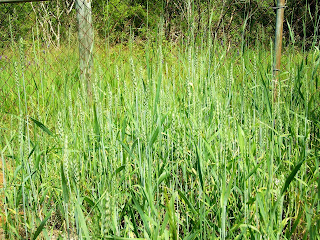I think that death, like sex and political corruption, is one of those things parents can't wait to have come up in conversation with their small children.
Um...
ok, maybe not.
I officiate at funerals pretty regularly, if not frequently, and we attend those as a family, so Jack is pretty familiar with the whole 'death' concept.

But this last year and a half has been one of rather more intense focus on death. Over the course of 12 months, we said goodbye to 21 or 22 people. (After a while, I stopped counting.)
The year of deaths gave us many opportunities to think about and talk about death, with each other and with Jack.
It all started around the 18
th of December 2007 and I had hoped that the curtain have been lowered on the epoch with the births of grandchildren to two close friends a few months ago.
And then on Saturday, as we returned home to water the garden on our way between Solstice adventures, we found a bunny flopping around in the back yard. It clearly had a broken leg and there was blood on its fur. While I watered the garden, Jack watched it and murmured encouragement, and then offered it lettuce from our garden and some water in a cup.
We discussed how Hazel had had a similar injury, in
Watership Down, and we decided to name out little friend hazel so maybe some of that healing luck would be spread to him. But we can't afford a vet bill right now, so all we could do was wish the poor little thing luck. We did agree that if it managed to survive until next day, we would see whether the Rabbit Rescue can help with a wild bunny. (They mostly rescue tame rabbits from what I understand.)
By the time we got back at 9pm, though, there was no sign at all of our little Hazel. Jack and I decided to believe that he had made it back to his warren, and that he was now resting safely and healing, but we know and discussed that he is even more vulnerable to predators while he can't run away and that he could die from his injury.
Hazel turned out to be a herald, though. Early Sunday morning, we learned that Rod's older brother is within days of ending his fight with the cancer that has ravaged his body. And so the topic of death comes back. Far from being afraid, our little pagan boy is accepts death as a part of the cycle in a way that will be harder to do for most of us adults.
He spent much of yesterday singing
dirges about his own death and his next life, and proclaiming that he's pretty sure that Uncle Carl has more time before he leaves. He told me at dinner, if Dad seems kinda quiet, it's because his brother is dying and he's sad.
Death. Yup. BIG topic of conversation lately.
So, how do you talk to a kid, a pagan kid, about death? First of all, it will come up sooner or later. No need to rush things. It might be an animal by the side of the road. It might be a book they read. It might, knock wood, be something far closer to home. But the questions start.
What does 'dead' mean?, Are you going to die? When? When will he come back? Does it hurt to die? Will I die?
Next, be careful to answer the questions the child is asking. Understand that as emotionally loaded as these questions are for us, to children, they are no different than other questions they ask to try to understand their world and depending on their age, the questions may be more mechanical and less existential than you might be expecting. Answer the question at hand, and don't overwhelm him or her with a lot of heavy emotional and intellectual stuff. When they're ready for that, they will ask.
It's important not to put your children off when they ask these hard questions. The best you can do is answer patiently, gently, and consistently, as many times as the child asks. (If their timing really sucks, explain that this is not a good time for that discussion, but be sure to get back to them within a short time with an opening to ask again.)
Once the questions start, there is no perfect answer.
The physical facts of death are pretty straightforward. Death is final. We all die eventually. Whether it hurts depends on how we die. Generally, we don't know exactly when our turn to die will come.
The harder questions, "why do we die? What happens to us after we die? Why does everyone cry when people die" The answers to those will depend a lot on what you believe about death. Whatever you say, how you feel about death, your fear or comfort, is going to be communicated to your child much more strongly than anything in your words. The best thing to do is to decide ahead of time what you think about death. If you can't deal with that (and many people can't go there) then decide what you want your child to believe.
You should probably base your answers on your spiritual path. Death is a very emotional topic, and if you try to wing it in the moment, your answers can be pretty confused and confusing and children ask again and again to see whether they understood. If your answer keeps changing, it doesn't help.
Our beliefs include reincarnation, and that has made it easier to answer Jack's questions.
What does "dead" mean? Dead means that our bodies have stopped having our soul living inside. Our bodies are like clothes for our soul, and when our soul is done with this body, it "takes it off", leaving the meat part of us behind. But the body can't keep going without a soul, just like your jeans can't run without you in them.
Why do we die? Sometimes bodies get very old and worn out or very sick, and it becomes impossible for them to keep going. Other times, we have finished what we came here to learn in this life, and our souls arrange for an accident. But it's not our personality's decision, and it's no one's fault. Our soul decided a long time before we were born what it wanted to learn from this life, and once it's done, it wants to move on to the next life and the next lesson. (This doesn't account for murder but we hope that one doesn't need to come up in our lives.)
Does is hurt to die? No, death doesn't hurt, although the accident or illness that comes before death often hurts a lot. Pain is part of having a meat body. Dying feels wonderful, because our soul gets to go through the light tunnel to the
Summerland, which is a place full of love and light where sadness doesn't happen and nothing hurts anymore.
Are you going to die? Often this is a bid for reassurance. We answer it by saying that yes, we are going to die someday, but we hope it's a LONG time from now, after Jack has grown up and has a
partner and children to love him. We also assure him that, should we
die sooner than we hope, we have arranged for Auntie Celeste and Auntie Dame to be his "spare
mammas". They will take care of him, and teach him, and love him. We also assure him that we will be watching and loving him from the S
ummerland until he's grown. Then, perhaps we can come back as *his* children, and then it will be his turn to teach us.
When will Uncle Al come back? Well...he won't. Not in Uncle Al's body, anyway. That body got all used up, even though he seemed to be fine. We don't know when his soul will come back, or where. Or even if he wants to come back. Some souls decide that they have learned what they wanted to know about living in a meat body, and they decide to stay in the
Summerland.
Why do people cry at funerals? Well, we know that the soul we loved is going to the
Summerland, where they will be very happy. But we are still going to miss them a lot. So we are crying for our sadness at losing the hugs and smiles and jokes of someone we love.
What is heaven? Heaven is the Christian version of the
Summerland. It is where Christians go to be with their God forever. It's beautiful and no one is ever sad there and no one ever hurts there. Just like the S
ummerland. The big difference is that Christians who go there to be with their God, aren't going to come back to live again in a new body.
Where will I go? That is your soul's decision. As a pagan child, I think you will probably go to the
Summerland, but if you decide to be Christian and spent the rest of forever with the Christian God, you could decide to go to Heaven.
Your answers will be different, because they will be based on your own beliefs, but I hope this has helped you to figure out how to approach the questions.
 We ate ice cream, and saw dinosaurs, and had a blast!
We ate ice cream, and saw dinosaurs, and had a blast! I am sunburnt, exhausted, and very, very happy.
I am sunburnt, exhausted, and very, very happy. Good night!
Good night!




 So I hope you'll enjoy this visual evidence of my progress in the garden.
So I hope you'll enjoy this visual evidence of my progress in the garden.



 Tricksy rabbit...but my goodness, he is pretty.
Tricksy rabbit...but my goodness, he is pretty.
 I believed it until a few days ago when I photographed it and then went out to Google to double check.
I believed it until a few days ago when I photographed it and then went out to Google to double check.

 I have been mostly out in the garden.
I have been mostly out in the garden.





